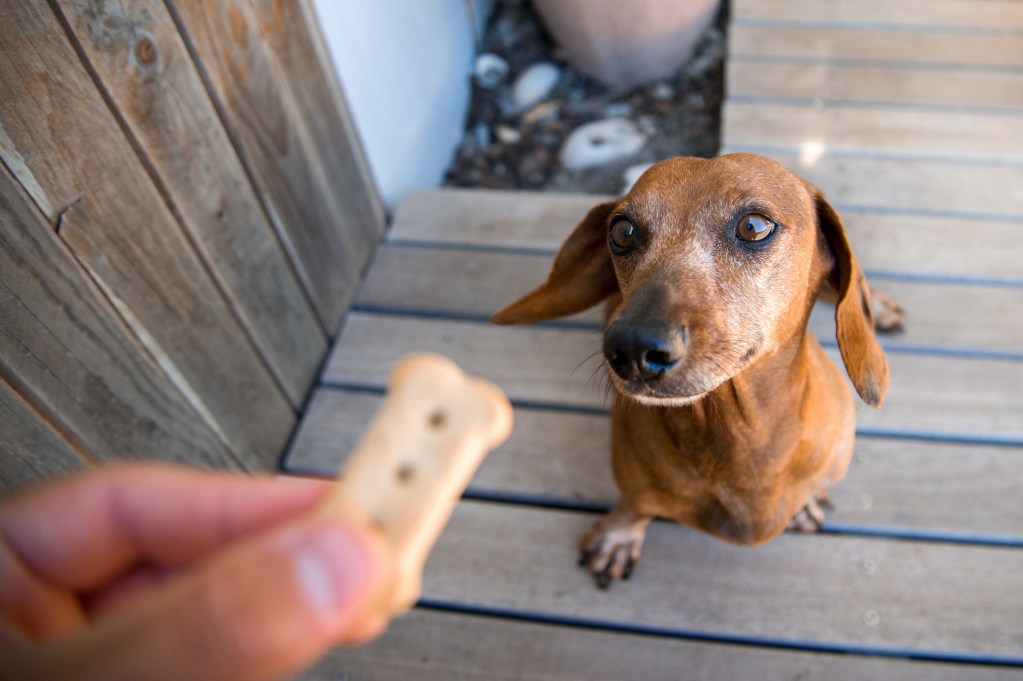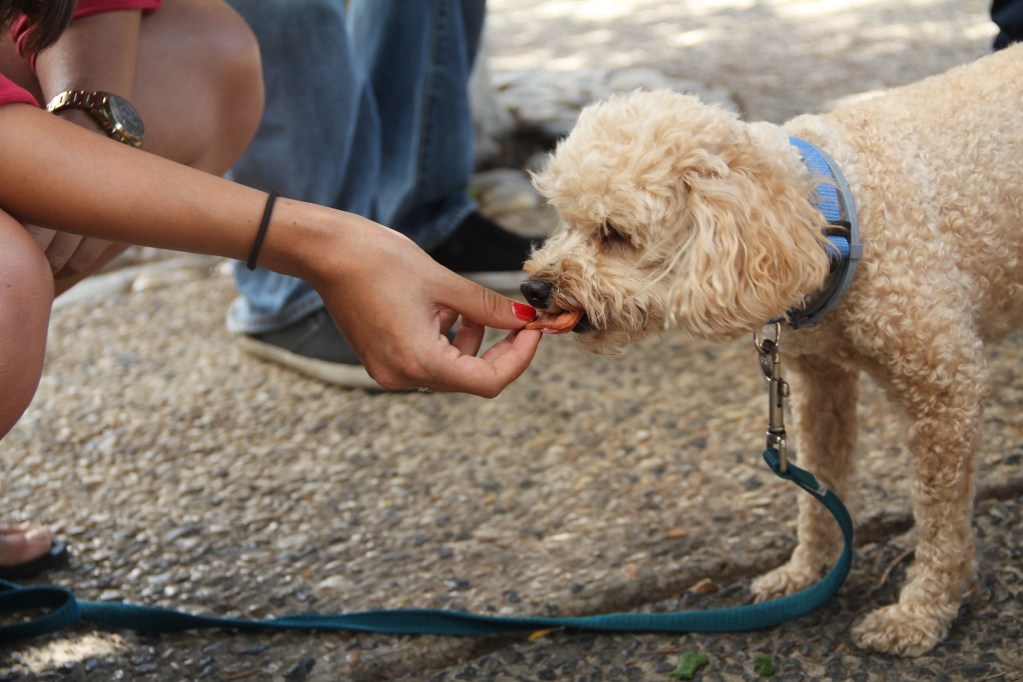
A diagnosis of canine diabetes can throw any dog owner for a loop, but with the right dietary management, these pups can live just as long and happily as any other. They don’t have to miss out on anything — even treats for diabetic dogs are becoming simpler to find… and to make! Homemade diabetic dog treats are a great option that gives pet parents more control over their furry friend’s diet, even just for treats. Every owner of a diabetic dog should consider them!
These treats are not only safe for diabetic dogs, but they’re also easy to make. Some take as little as five minutes! With diverse ingredients from veggies to protein and even a little fruit, you’ll have plenty of options to give your health-conscious pup something yummy. Who said healthy had to be boring?

What to look for in a healthy treat for diabetic dogs
When your dog has been recently diagnosed with diabetes, you may feel pressure to change every little thing about their diet. The good news is that many ingredients you have at home are perfectly suitable for your diabetic dog, and if you already make dog treats at home, you may not have to make as many changes as you thought.
Veterinary surgeon Alex Crow explains that there are 5 key features of a healthy dog treat that you should look for:
- No obvious sources of sugar
- Complex grains and/or carbohydrates
- Meat or meat products
- High fiber content
- Low fat content
He also notes that dry and crunchy dog treats have a lower glycemic index (meaning they are absorbed slowly into the bloodstream and do not cause a blood sugar spike) than moist and chewy treats. This is because it takes longer for a dog to chew, swallow, and digest the dry treat, so this is something to keep in mind as well.

Dried carrot “jerky” is healthy, mouthwatering, and surprisingly easy to make
Vegetables are fantastic diabetic dog treats since they’re low in sugar and high in fiber, though not all dogs will happily munch on some raw or cooked veggies at a moment’s notice. Making dehydrated carrot “jerky” is a great way to solve this problem while giving your furry friend something to gnaw on for a while.
You’ll begin with whole, regular carrots. Make sure to blanch them before dehydrating, which is simply soaking them in boiling water for 5 minutes. Then, you’re ready to chop! When you slice your veggies, you can make either bite-sized morsels or larger jerky chews for your pup, though the bigger pieces will take much longer to cook.
When dehydrating carrots, use low heat (about 125 degrees) for a long time. You can expect small pieces to become dark and leathery — that’s when you know they’re ready — in as little as 2 hours, while larger pieces may have to sit for 10 hours or more. Luckily, you get to kick back and relax while all this is happening, so you’ll need to dedicate only about half an hour to the actual work!
If your pup isn’t a fan of veggies–even dehydrated ones–there are a few dog-safe herbs and spices you can add in small amounts. This includes cilantro, dill, cinnamon, ginger, sage, thyme, and turmeric. Remember not to use essential oils or extracts, as these are extremely strong and are not safe for pets.

Bite-sized frozen yogurt treats are the perfect summertime delicacy
Frozen treats are awesome rewards for those hot summer months, especially right after playtime or a walk. Luckily, you can make delicious treats for your diabetic dog, too, so he won’t have to miss out on the fun. Freezing plain, nonfat yogurt is a great way to do this, though you can also freeze unsweetened apple sauce. Make sure anything you use is low in sugar and does not contain artificial sweeteners, as many of these can be toxic for dogs.
Mix in some morsels of canine-approved fruit for a sweet surprise. Blueberries are full of antioxidants and vitamins (and they’re super yummy), which makes them a great choice. Keep in mind that fruit is higher in sugar than veggies, so even though it’s fresh produce, it needs to be given in moderation.
With your chosen ingredients, just fill ice cube trays and freeze!

Try this beef liver baked treat recipe from Hillrose Pet Resort
With just three ingredients and about half an hour of prep, these treats are both easy and healthy. Liver, the main ingredient, is a nutrient-dense protein that gives your dog plenty of copper, vitamin A, B vitamins, iron, and zinc. Chicken liver is also safe for dogs, but beef liver is lower in fat and calories. That’s ideal for pups who need to watch their diet.
Here’s what you need, according to the recipe from Hillrose Pet Resort:
- 1½ pounds beef liver, chopped
- 2 eggs
- ½ cup whole wheat flour
Heat your oven to 350 degrees before you start. Next, finely chop or process the liver until it’s nearly ground, then mix in the eggs and flour (either in the processor or by hand). Line a baking sheet with parchment paper into which the mixture is to be spread. Now — just like a cake — bake this concoction for 15 minutes, let it cool, then cut it into bite-sized pieces and store it in the fridge until you’re ready to reward your pup.

Scrambled eggs make an easy, yummy diabetic dog treat, though you may want to steal some for yourself
Eggs are an awesome source of protein for pets, plus they don’t run the risk of raising glucose levels. That’s perfect for diabetic doggos! Some veterinarians recommend feeding only the egg whites to your pup, as the whites have less fat and cholesterol than the yolk but scrambled whole eggs in moderation are fine for most dogs. If you’re unsure, ask your vet!
All you really need to do is scramble the eggs on the stovetop like you normally would, though without any seasonings, spices, or oils. Not only are these add-ins unhealthy for pups, but they’re also not necessarily safe. Once they’ve cooled, your dog will love small bites of scrambled egg — and you can easily store the rest for later.
As long as you’re diligent about keeping your dog’s blood glucose levels in check, the majority of low-fat and low-sugar treats can be awesome rewards for a job well done. Veterinarians are also chock-full of ideas for managing your dog’s diet — whether or not they have diabetes — so they can be a great resource as well. What kind of snacks do your diabetic dogs enjoy?



